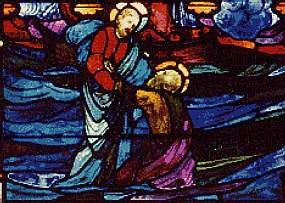One of the many mistakes I believe Christians make today concerns viewing the Bible as a book of answers. That may be true to a point, especially for the babe in Christ, but I find that as I mature the Bible holds just as many questions as it does answers, perhaps more.
Take the opening Psalm:
Blessed is the man who walks not in the counsel of the wicked, nor stands in the way of sinners, nor sits in the seat of scoffers; but his delight is in the law of the LORD, and on his law he meditates day and night. He is like a tree planted by streams of water that yields its fruit in its season, and its leaf does not wither. In all that he does, he prospers. The wicked are not so, but are like chaff that the wind drives away. Therefore the wicked will not stand in the judgment, nor sinners in the congregation of the righteous; for the LORD knows the way of the righteous, but the way of the wicked will perish.
—Psalm 1
Out getting our teeth worked on today, my son and I listened to John MacArthur’s “Grace to You” program. See, I’m one of those countercultural fools who likes my Christian radio packed with teaching, as opposed to what passes for music on those same channels. Fortunately, I just so happened to tune in right as MacArthur started his program. When I heard he’d be expositing Psalm 1, one of my favorite Psalms, I stayed put.
MacArthur did a great job, but then stumbled egregiously on the very heart of the Psalm:
He is like a tree planted by streams of water that yields its fruit in its season, and its leaf does not wither. In all that he does, he prospers.
—Psalms 1:3
See, MacArthur got super-spiritual and claimed that “In all he does, he prospers,” refers to spiritual prosperity. But the text doesn’t say that. It says in ALL he does he prospers. Yes, his spiritual life prospers, but so does his physical, emotional, and intellectual life. God blesses him with prosperity in all aspects of life. He’s got a supermodel for a wife, the world’s greatest klatch of kids, money in the bank, the respect of his peers, a voice that people heed, a powerful network of business partners, and on and on. When the town needs something done, it goes to the Psalm One Guy.
What bothered me was MacArthur’s New Testament-izing of that Old Testament passage. And it shows me how poorly we Christians integrate the Old Testament with the New. In fact, I would say that we don’t truly integrate the OT and NT, but instead form our denominations around which one we prefer!
What do I mean by that?
Well, I think that we have folks in the Church who divide into two camps, one that leans heavily on the OT for its theology, and one that goes NT.
Pentecostals, Assemblies of God, charismatics, and a lot of mainline Protestant churches stand their ground on the OT. When they talk about believing the promises of God, they stand on verses that God spoke over His chosen people, verses that talk about taking the land, abiding in the promises, overthrowing giants, growing from the least into the greatest, and fire coming down out of heaven to consume one’s enemies. It’s a view that sees the godly man as the pillar of his community,  a community of chosen established by God. It’s lowly Israel made a great nation, its men held up for esteem so that kings seek them out.
a community of chosen established by God. It’s lowly Israel made a great nation, its men held up for esteem so that kings seek them out.
On the other side, many Evangelicals pitch their tent in a NT view that sees the Church as a persecuted, ragtag bunch of misfits held together by grace. The godly man is not only poor in spirit, but quite possibly poor in purse. Verses that appeal to this view hold up dying to self, renouncing worldly gain, becoming the scum of the earth, and abandoning earthly prosperity for heavenly reward. The godly man is the one speared to death in a Roman colosseum, a martyr for the cause of Christ.
So these two camps war. The NT proponents enter the OT and start revising all the verses to fit their idea of what the true NT man must be. The OT proponents, though, wade into the NT and try to dismantle the NT camp’s “suffering servants.”
This, to me, explains why John MacArthur must overlay Psalm 1 with a spiritualized meaning rather than taking it at its word. He espouses the NT camp’s philosophy, so it can’t possibly mean that God prospers a man by giving him earthly wealth. As MacArthur jumped back into the NT for the rest of his teaching, he showed his hand by defaulting to NT readings that reinforced the spiritualization of Psalm 1.
And that leaves me with questions.
To me, Psalm 1 is clear, as are the rest of the OT passages that support God prospering the righteous with wealth, power, and respect. And I also see the NT side that supports a view of the Church as the downtrodden of society who have received the Good News when the rich and powerful did not. Both are clearly in the Scriptures, and both are clearly true.
Now, how do we reconcile them?
First, I’d like the OT camp to realize that “taking dominion” doesn’t always look like a Lexus in the driveway. Sometimes the greatest saints of God are the most lowly. To the NT camp, not every person who’s named the name of Christ winds up crucified upside down. Many of the Church’s greatest scholars and theologians came from privileged homes. Some even bankrolled their churches.
God may desire to have some become poor to prosper the Kingdom, while in His good measure He deems that some acquire wealth, power, and respect to expand that same Kingdom. Both OT and NT Christians don’t wish to hear this, though. It strikes me even more odd that many of the world’s poor take the OT side, while the rich of the world take the NT side, yet neither truly experiences the reality of the side they hope to claim!
Like so many things in the Christian walk, the truth may well reside in the middle of those two views. Attempting to make a law out of either side only creates trouble and misunderstanding. The Pentecostal who believes that God will bless and prosper him gets the “prosperity gospel” label by the other side, while the conservative Baptist is seen as a sad sack who hasn’t appropriated his inheritance as a child of the King of Kings.
Despite what the two camps say, I don’t believe they’re mutually exclusive. But finding that overlap (where I believe truth reigns) requires work and possibly abandoning preconceptions, two things that don’t come easy to the American Church circa 2007.
It means asking plenty of questions, too. I’m willing to work at discovering that middle ground, though. Anyone else?
 It’s the question of whether we see ourselves as sinners or saints.
It’s the question of whether we see ourselves as sinners or saints.
 That way if there are no immediate results, we can make excuses about them being “invisible.”
That way if there are no immediate results, we can make excuses about them being “invisible.” a community of chosen established by God. It’s lowly Israel made a great nation, its men held up for esteem so that kings seek them out.
a community of chosen established by God. It’s lowly Israel made a great nation, its men held up for esteem so that kings seek them out.